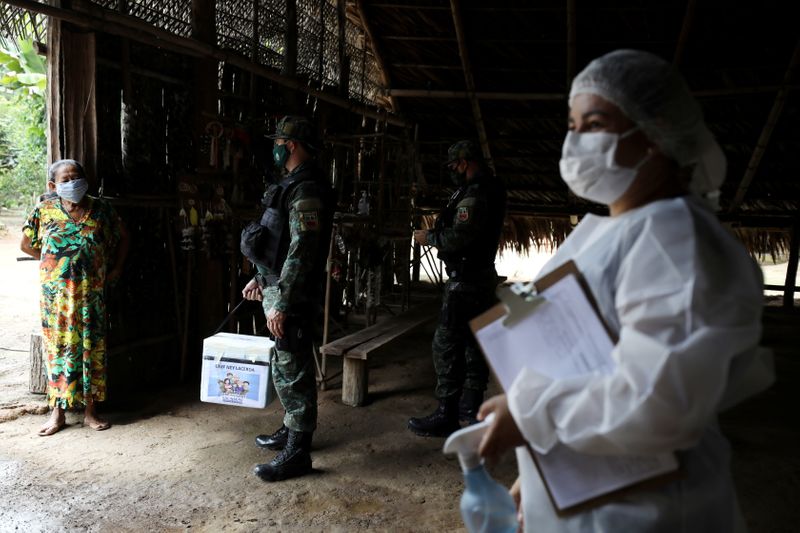By Anthony Boadle
BRASILIA (Reuters) - Medical teams working to immunize Brazil's remote indigenous villages against the coronavirus have encountered fierce resistance in some communities where evangelical missionaries are stoking fears of the vaccine, say tribal leaders and advocates.
On the São Francisco reservation in the state of Amazonas, Jamamadi villagers sent health workers packing with bows and arrows when they visited by helicopter this month, said Claudemir da Silva, an Apurinã leader representing indigenous communities on the Purus river, a tributary of the Xingú.
"It's not happening in all villages, just in those that have missionaries or evangelical chapels where pastors are convincing the people not to receive the vaccine, that they will turn into an alligator and other crazy ideas," he said by phone.
That has added to fears that COVID-19 could roar through Brazil's more than 800,000 indigenous people, whose communal living and often precarious healthcare make them a priority in the national immunization program.
Tribal leaders blame Brazil's far-right President Jair Bolsonaro and some of his avid supporters in the evangelical community for stoking skepticism about coronavirus vaccines, despite a national death toll that lags only the United States.
"Religious fundamentalists and evangelical missionaries are preaching against the vaccine," said Dinamam Tuxá, a leader of APIB, Brazil's largest indigenous organization.
The Association of Brazilian Anthropologists denounced unspecified religious groups in a statement on Tuesday for spreading false conspiracy theories to "sabotage" the vaccination of indigenous people.
Many pastors of Brazil's urban evangelical megachurches are urging followers to get vaccinated, but they say missionaries in remote territories have not gotten the message.
"Unfortunately, some pastors who lack wisdom are spreading misinformation to our indigenous brethren," said Pastor Mario Jorge Conceição of the Assembly of God Traditional Church in Manaus, the capital of Amazonas state.
The government's indigenous health agency Sesai told Reuters in a statement that it was working to raise awareness of the importance of coronavirus immunization.
Bolsonaro has played down the severity of the virus and refused to take a vaccine himself. He has aimed special derision at the country's most widely available shot, made by China's Sinovac Biotech, citing doubts about its "origins."
At an event in December, the president ridiculed vaccine maker Pfizer (NYSE:PFE) because he said the company had refused to assume liability for collateral effects in talks with his government.
"If you take the vaccine and turn into an alligator, it's your problem. If you turn into Superman or women grow beards, I have nothing to do with that," Bolsonaro said sarcastically.
Pfizer has said it proposed standard contractual guarantees to the Brazilian government that other countries accepted before using its vaccine.
Access to social media even in remote corners of Brazil has fanned false rumors about the coronavirus vaccines.
For instance, 56-year-old tribal chief Fernando Katukina, of the Nôke Kôi people near the Peru border, died Feb. 1 of cardiac arrest related to diabetes and congestive heart failure. Word spread rapidly on social media and radio that the COVID-19 vaccine he received in January had caused his death.
The Butantan biomedical center, which is producing and distributing the Sinovac vaccine, scrambled to convince indigenous people that was not the case.
"The social media messages saying that Fernando Katukina died after taking a COVID-19 vaccine are fake news," Butantan wrote in a tweet.

COVID-19 has killed at least 957 indigenous people, according to APIB, out of some 48,071 confirmed infections among half of Brazil's 300 native ethnic groups. The numbers could be much higher, because health agency Sesai only monitors indigenous people living on reservations.